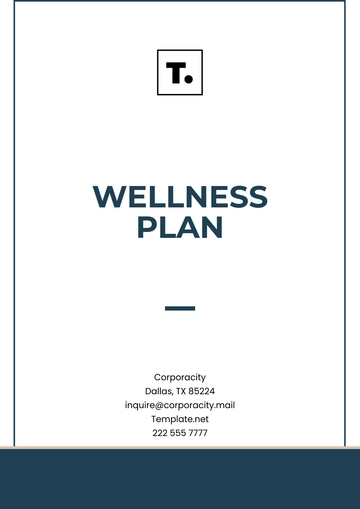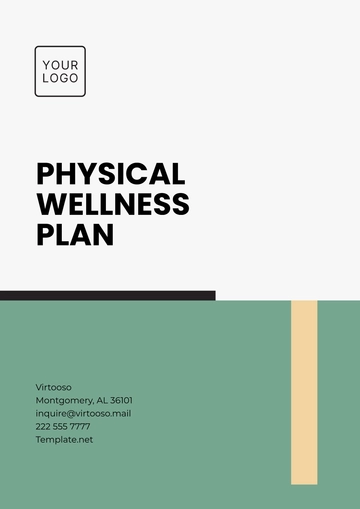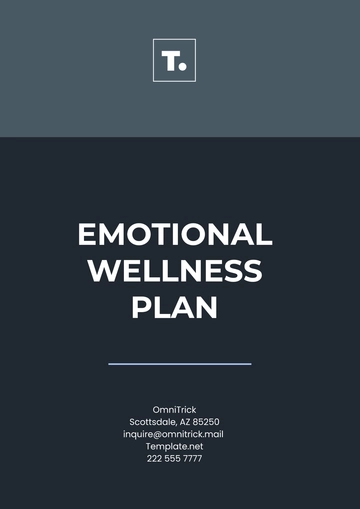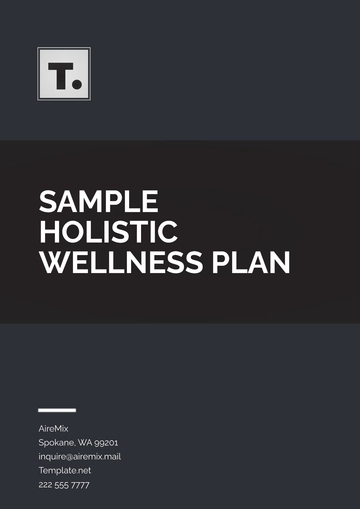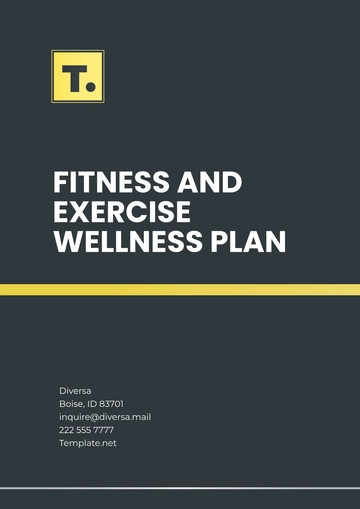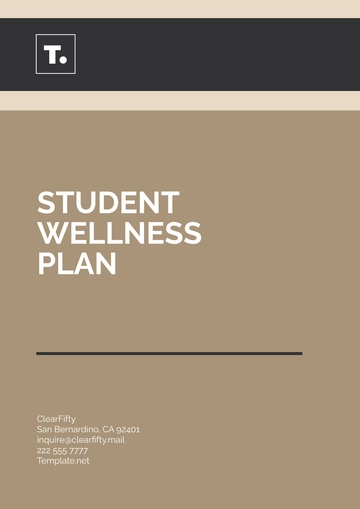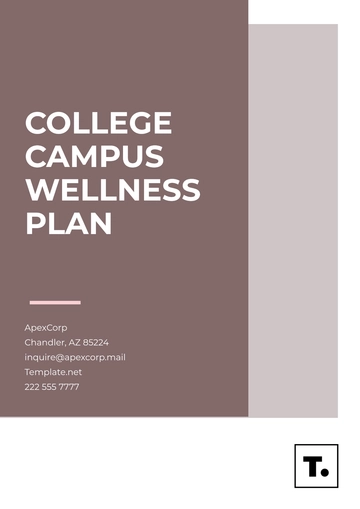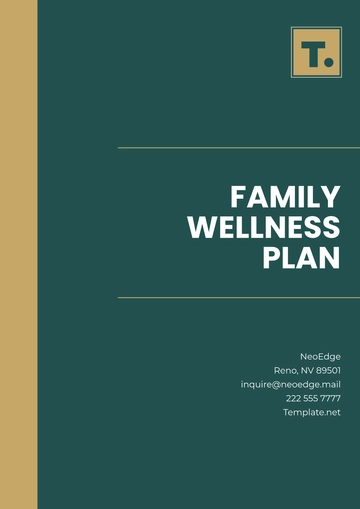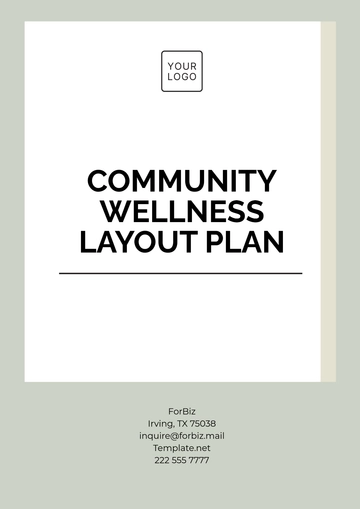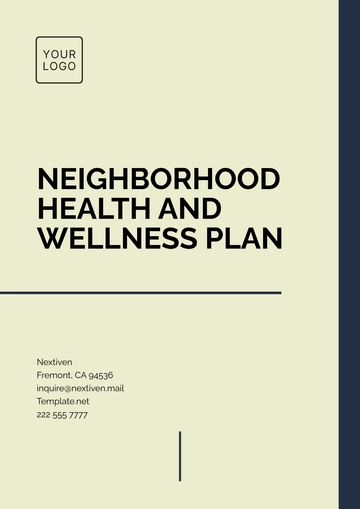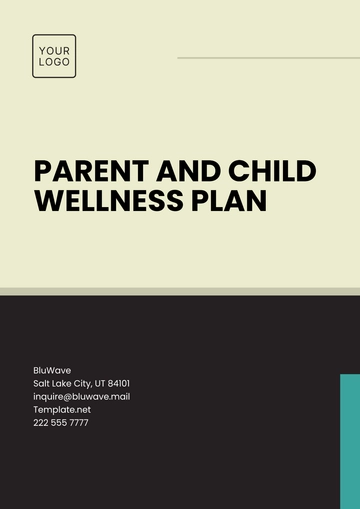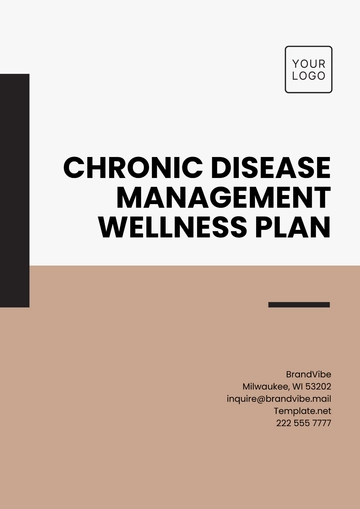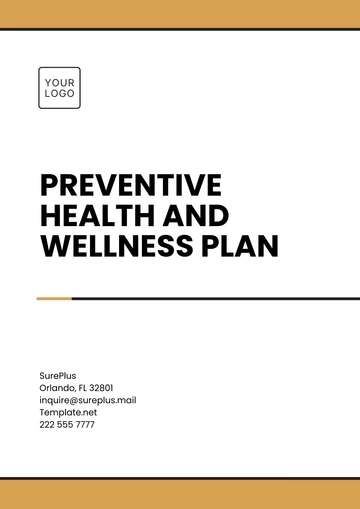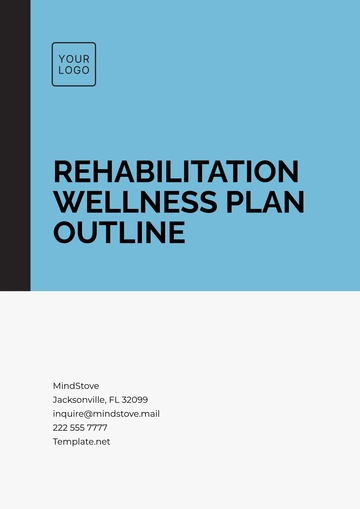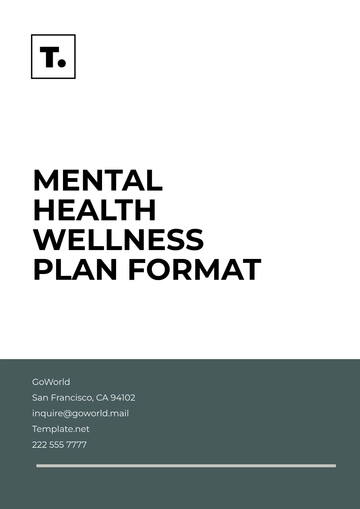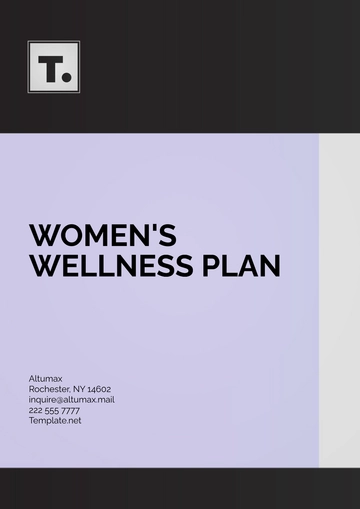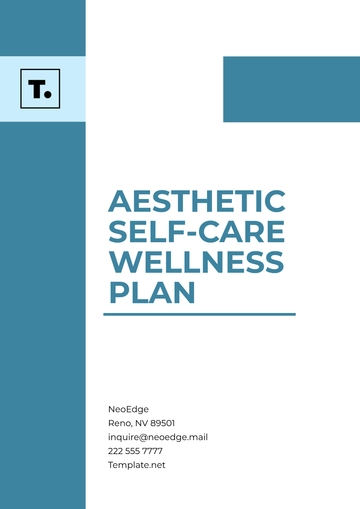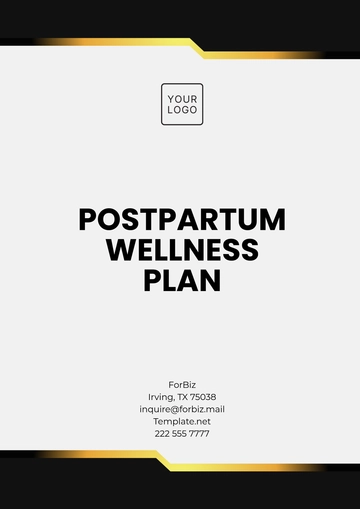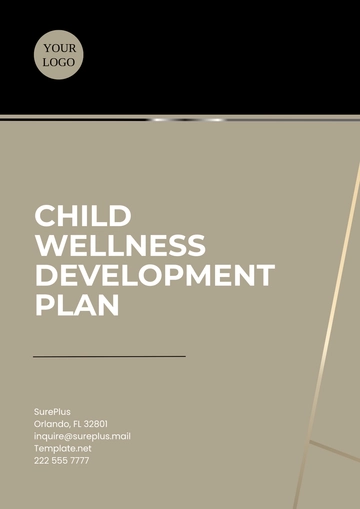Free Sample Holistic Wellness Plan
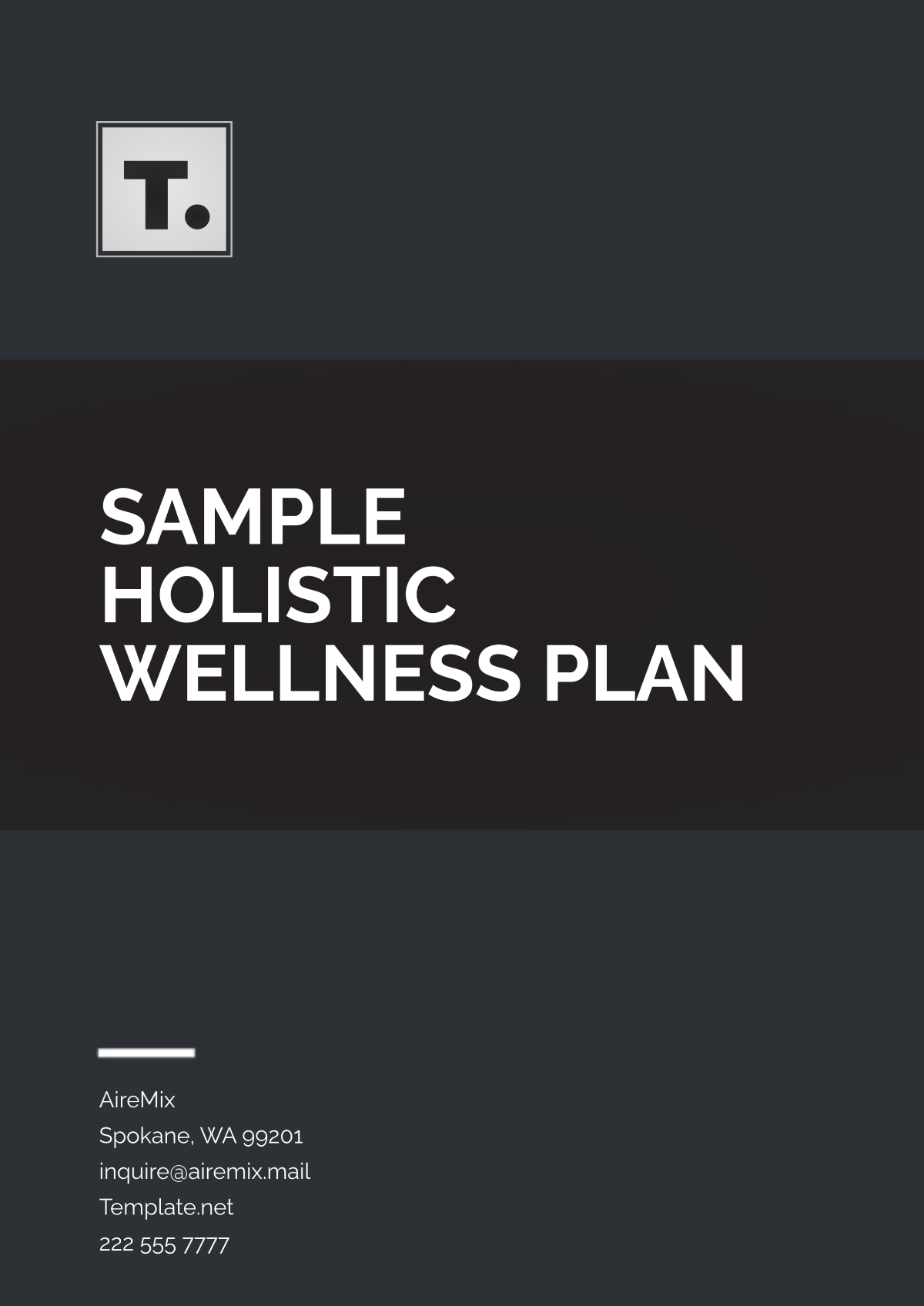
Prepared by: [Your Name]
Company: [Your Company Name]
Date: [Insert Date]
I. Introduction
Holistic wellness is a comprehensive approach to health that considers the mind, body, and spirit as interconnected and essential for overall well-being. This Holistic Wellness Plan aims to provide individuals with the tools, strategies, and support necessary to achieve balance in all aspects of life. By focusing on physical, mental, emotional, social, spiritual, and environmental health, this plan fosters a sustainable path to overall wellness and happiness.
II. Vision and Goals
Vision:
To create a thriving, balanced environment where individuals embrace a holistic approach to wellness, fostering personal growth, health, and well-being in all areas of life.
Goals:
Promote physical, mental, emotional, and spiritual well-being through balanced wellness strategies.
Provide resources and support for managing stress, building resilience, and achieving personal growth.
Cultivate a community of individuals who prioritize holistic wellness, engage in self-care, and support one another’s well-being.
Encourage sustainable lifestyle choices that positively impact individual health and the environment.
III. Key Areas of Focus and Strategies
1. Physical Wellness
Strategies:
Fitness Programs: Organize weekly fitness sessions such as yoga, Pilates, strength training, and walking clubs.
Nutritional Support: Offer healthy snacks, nutrition workshops, and meal planning guidance to promote healthy eating habits.
Health Screenings: Provide annual health check-ups and encourage regular physical exams to monitor key health indicators.
Ergonomic Support: Provide ergonomic furniture and promote proper posture techniques to reduce physical strain at workstations.
Rest and Recovery: Encourage proper sleep hygiene, mindfulness relaxation techniques, and regular breaks during the workday.
2. Mental Wellness
Strategies:
Stress Management Workshops: Offer quarterly workshops on stress reduction techniques such as deep breathing, progressive muscle relaxation, and mindfulness meditation.
Mental Health Resources: Provide access to counseling services, online therapy resources, and mental health awareness initiatives.
Focus and Productivity Support: Introduce focus-enhancing tools such as the Pomodoro technique, time management training, and mindfulness exercises to improve mental clarity.
Cognitive Well-being: Encourage brain-health activities, such as puzzles, memory games, and learning new skills, to promote cognitive health.
3. Emotional Wellness
Strategies:
Emotional Intelligence Training: Offer workshops on developing emotional intelligence to help individuals recognize, understand, and manage their emotions effectively.
Peer Support Networks: Create a community support system where employees can share experiences and offer emotional support.
Gratitude Practices: Implement gratitude challenges, encouraging individuals to reflect on positive aspects of their lives to foster a positive mindset.
Conflict Resolution Skills: Offer conflict resolution and communication skills training to enhance relationship-building and reduce emotional stress.
4. Social Wellness
Strategies:
Community Building Events: Organize monthly social events such as potlucks, game nights, or volunteer opportunities to foster connection and a sense of belonging.
Team Building Activities: Facilitate team-building exercises that strengthen relationships and promote collaboration in both personal and professional settings.
Inclusive Culture: Promote diversity and inclusion by supporting open communication and creating a welcoming environment for all members of the community.
Social Media Detox: Encourage digital detox days or periods where individuals disconnect from social media to foster real-life connections.
5. Spiritual Wellness
Strategies:
Mindfulness and Meditation Sessions: Provide regular sessions focused on mindfulness, meditation, and guided relaxation to promote inner peace and spiritual well-being.
Personal Growth Workshops: Organize workshops focused on self-discovery, personal development, and finding meaning and purpose in life.
Nature Engagement: Offer nature walks, hikes, or retreats to connect with the environment and promote spiritual renewal.
Values and Purpose Alignment: Encourage individuals to explore and align their personal values and life goals with their actions, helping them achieve a sense of fulfillment and purpose.
6. Environmental Wellness
Strategies:
Sustainable Practices: Encourage recycling, composting, and minimizing the use of single-use plastics to promote environmental responsibility.
Green Spaces: Enhance work and community environments with plants, natural lighting, and outdoor spaces to improve mood and productivity.
Eco-Friendly Transportation: Promote biking, walking, carpooling, or using public transportation to reduce carbon footprints.
Energy Efficiency: Advocate for energy-saving measures, such as reducing electricity usage and incorporating renewable energy sources in daily activities.
IV. Implementation Plan
Roles and Responsibilities:
Wellness Committee: Oversee the planning, execution, and evaluation of wellness programs and initiatives.
Leadership Team: Provide necessary resources and support to ensure the success of wellness initiatives.
Participants: Actively engage in wellness activities, provide feedback, and support fellow participants in their wellness journey.
Timeline:
Phase 1 (Month 1–3): Needs assessment and initial program planning. Introduce fitness programs, mental health resources, and initial wellness workshops.
Phase 2 (Month 4–6): Roll out community-building events, and social wellness activities, and introduce sustainability initiatives.
Phase 3 (Month 7–12): Evaluate program effectiveness, refine strategies, and introduce additional resources to support holistic wellness.
V. Measurement and Evaluation
Key Performance Indicators (KPIs):
Participation Rates: Track the number of participants in various wellness programs and activities.
Health Metrics: Monitor improvements in health-related metrics such as physical fitness levels, stress levels, and emotional well-being (via surveys or self-reporting).
Engagement Levels: Measure engagement through feedback surveys, participation in events, and group discussions.
Community Impact: Track the number of social wellness events held and the level of connection among participants.
Evaluation Methods:
Conduct quarterly surveys to assess the effectiveness of wellness programs.
Use focus groups to collect qualitative feedback from participants about their wellness experiences.
Regularly review KPIs and adjust strategies to improve engagement and outcomes.
VI. Sustainability Plan
Ongoing Support: Ensure the continuity of wellness initiatives by securing ongoing funding, resources, and leadership support.
Evolving Programs: Regularly update wellness programs to meet the evolving needs of participants and incorporate new trends in health and wellness.
Digital Tools: Develop an app or digital platform where participants can access wellness resources, track progress, and engage with the community.
Community Involvement: Continue to involve the community in the planning and execution of wellness activities to ensure that the programs remain relevant and engaging.
VII. Conclusion
This Holistic Wellness Plan serves as a comprehensive framework for fostering well-being in all aspects of life—physical, mental, emotional, spiritual, social, and environmental. By integrating these key areas into everyday life and creating a culture of wellness, we can empower individuals to take charge of their health and happiness. Together, we will create a supportive, thriving community that encourages growth, connection, and fulfillment.
Through consistent effort, evaluation, and adaptability, this plan aims to cultivate a sustainable, holistic approach to wellness that enhances the lives of all participants.
- 100% Customizable, free editor
- Access 1 Million+ Templates, photo’s & graphics
- Download or share as a template
- Click and replace photos, graphics, text, backgrounds
- Resize, crop, AI write & more
- Access advanced editor
You may also like
- Finance Plan
- Construction Plan
- Sales Plan
- Development Plan
- Career Plan
- Budget Plan
- HR Plan
- Education Plan
- Transition Plan
- Work Plan
- Training Plan
- Communication Plan
- Operation Plan
- Health And Safety Plan
- Strategy Plan
- Professional Development Plan
- Advertising Plan
- Risk Management Plan
- Restaurant Plan
- School Plan
- Nursing Home Patient Care Plan
- Nursing Care Plan
- Plan Event
- Startup Plan
- Social Media Plan
- Staffing Plan
- Annual Plan
- Content Plan
- Payment Plan
- Implementation Plan
- Hotel Plan
- Workout Plan
- Accounting Plan
- Campaign Plan
- Essay Plan
- 30 60 90 Day Plan
- Research Plan
- Recruitment Plan
- 90 Day Plan
- Quarterly Plan
- Emergency Plan
- 5 Year Plan
- Gym Plan
- Personal Plan
- IT and Software Plan
- Treatment Plan
- Real Estate Plan
- Law Firm Plan
- Healthcare Plan
- Improvement Plan
- Media Plan
- 5 Year Business Plan
- Learning Plan
- Marketing Campaign Plan
- Travel Agency Plan
- Cleaning Services Plan
- Interior Design Plan
- Performance Plan
- PR Plan
- Birth Plan
- Life Plan
- SEO Plan
- Disaster Recovery Plan
- Continuity Plan
- Launch Plan
- Legal Plan
- Behavior Plan
- Performance Improvement Plan
- Salon Plan
- Security Plan
- Security Management Plan
- Employee Development Plan
- Quality Plan
- Service Improvement Plan
- Growth Plan
- Incident Response Plan
- Basketball Plan
- Emergency Action Plan
- Product Launch Plan
- Spa Plan
- Employee Training Plan
- Data Analysis Plan
- Employee Action Plan
- Territory Plan
- Audit Plan
- Classroom Plan
- Activity Plan
- Parenting Plan
- Care Plan
- Project Execution Plan
- Exercise Plan
- Internship Plan
- Software Development Plan
- Continuous Improvement Plan
- Leave Plan
- 90 Day Sales Plan
- Advertising Agency Plan
- Employee Transition Plan
- Smart Action Plan
- Workplace Safety Plan
- Behavior Change Plan
- Contingency Plan
- Continuity of Operations Plan
- Health Plan
- Quality Control Plan
- Self Plan
- Sports Development Plan
- Change Management Plan
- Ecommerce Plan
- Personal Financial Plan
- Process Improvement Plan
- 30-60-90 Day Sales Plan
- Crisis Management Plan
- Engagement Plan
- Execution Plan
- Pandemic Plan
- Quality Assurance Plan
- Service Continuity Plan
- Agile Project Plan
- Fundraising Plan
- Job Transition Plan
- Asset Maintenance Plan
- Maintenance Plan
- Software Test Plan
- Staff Training and Development Plan
- 3 Year Plan
- Brand Activation Plan
- Release Plan
- Resource Plan
- Risk Mitigation Plan
- Teacher Plan
- 30 60 90 Day Plan for New Manager
- Food Safety Plan
- Food Truck Plan
- Hiring Plan
- Quality Management Plan
- Wellness Plan
- Behavior Intervention Plan
- Bonus Plan
- Investment Plan
- Maternity Leave Plan
- Pandemic Response Plan
- Succession Planning
- Coaching Plan
- Configuration Management Plan
- Remote Work Plan
- Self Care Plan
- Teaching Plan
- 100-Day Plan
- HACCP Plan
- Student Plan
- Sustainability Plan
- 30 60 90 Day Plan for Interview
- Access Plan
- Site Specific Safety Plan
